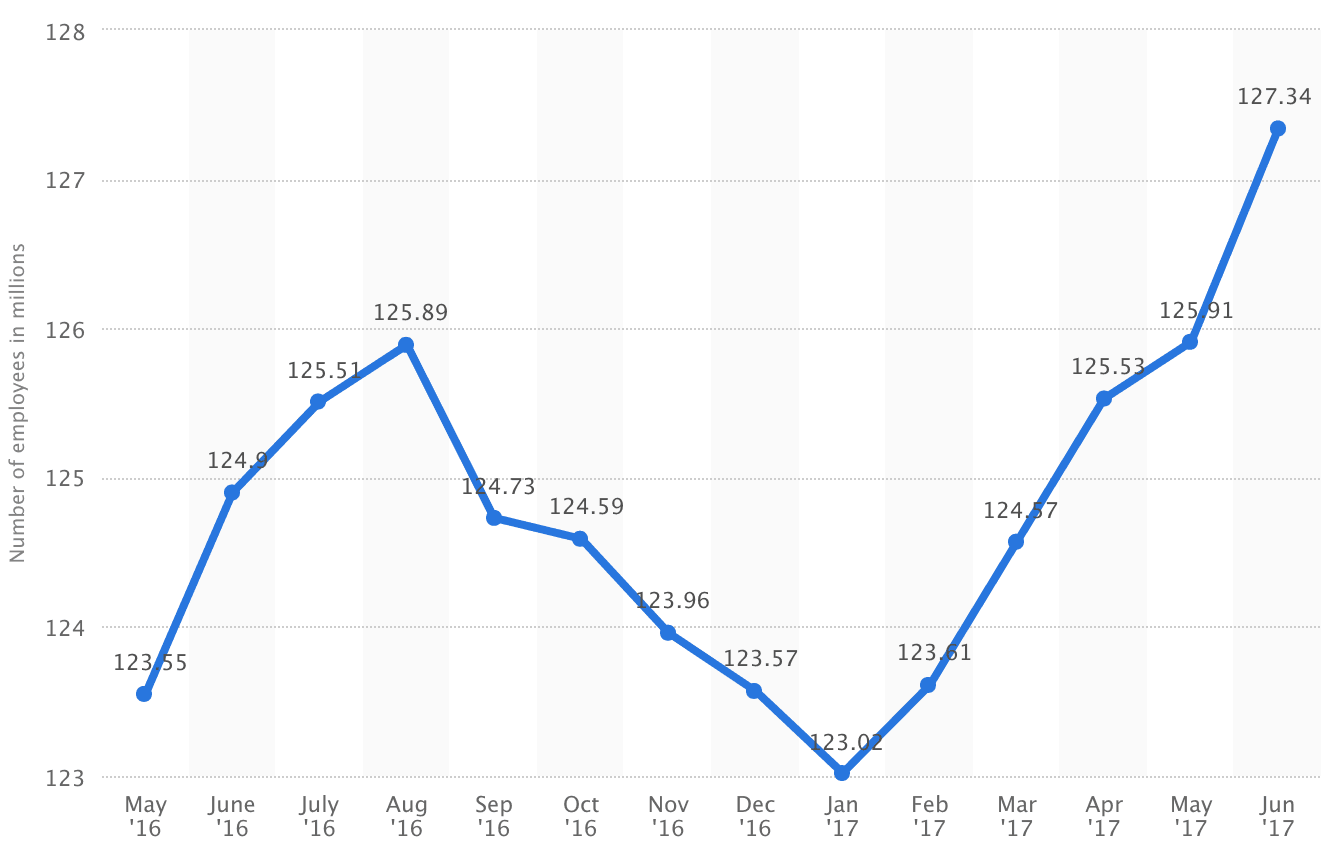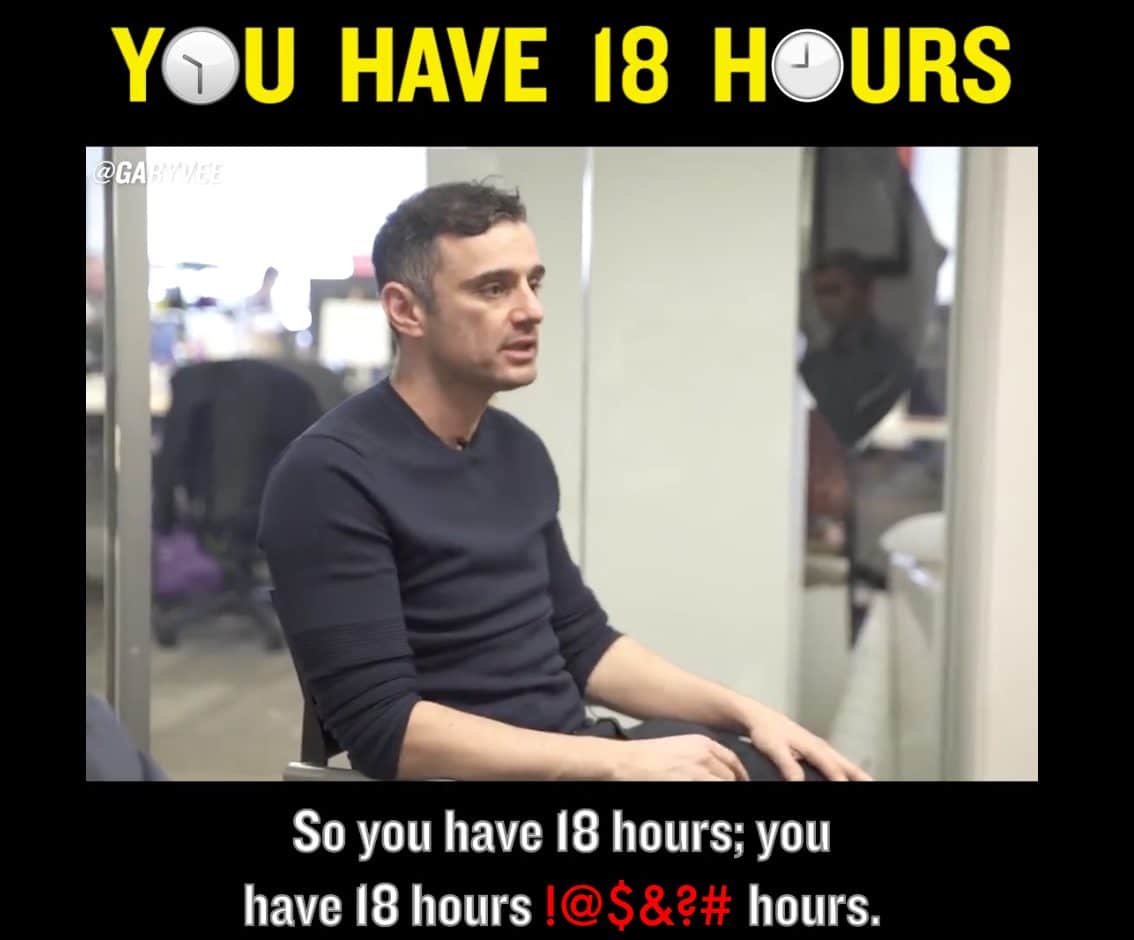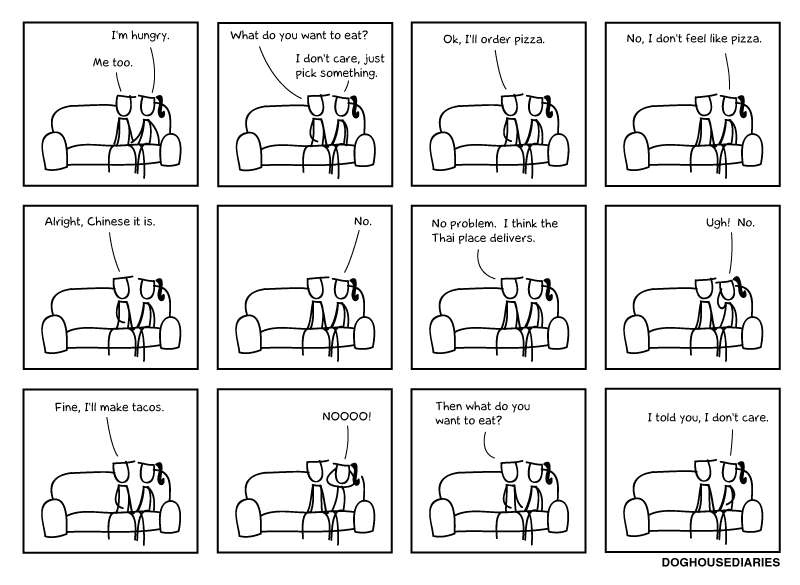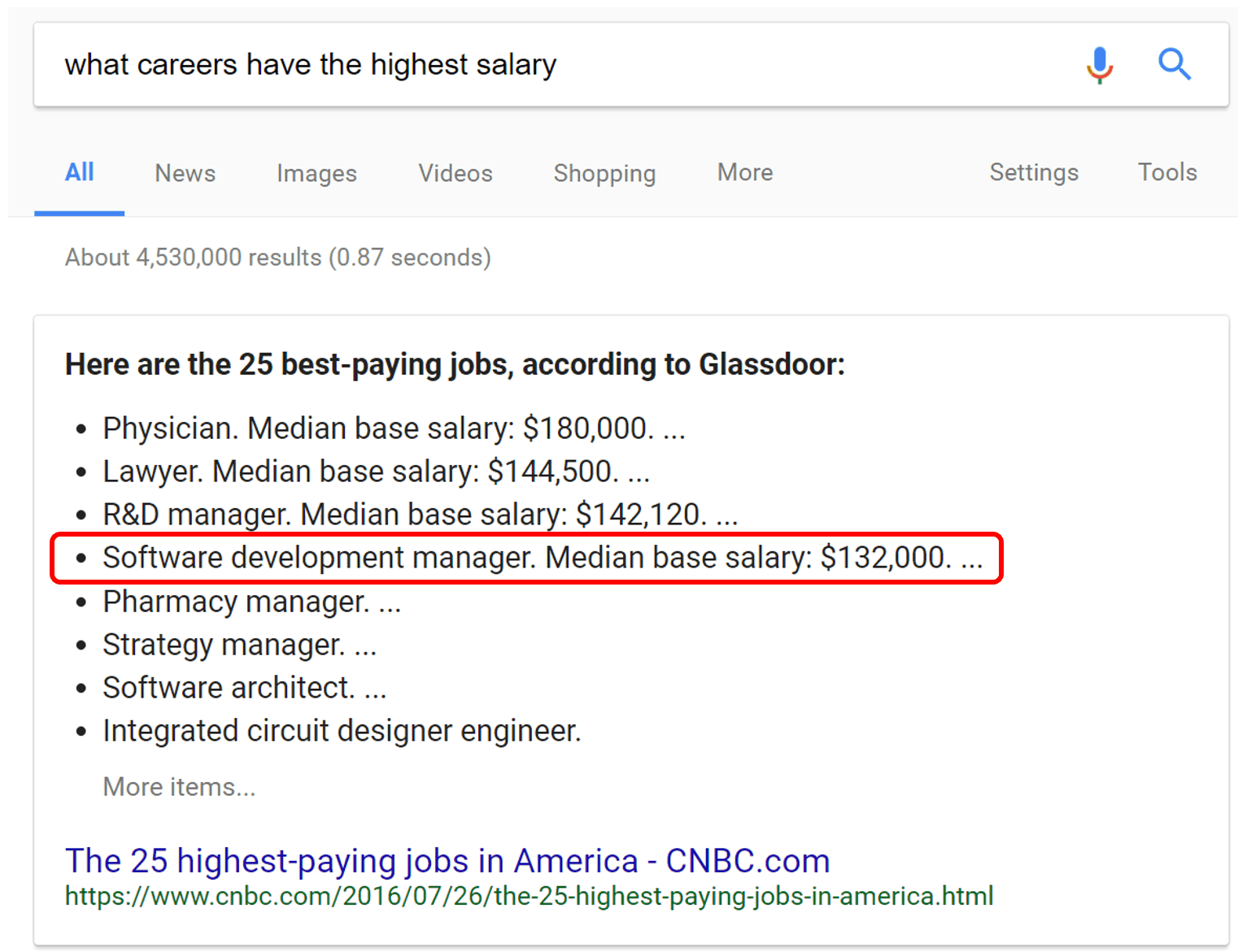Job searching can be incredibly frustrating.
Sometimes you wish someone would just pull back the curtain, show you the mistakes you're making, and point you in the right direction. I know because I've been there.
When I graduated from college, I'd spent a grand total of about 5 minutes thinking about my professional life. I thought you went to school and that automatically landed you a job you liked with a great salary. After all, why else would anyone pay that kind of money for a degree?
Four weeks into my first “real job,” life gave me a nice slap in the face.
I had graduated from college with a biology degree and ended up taking a job in the medical field. It didn't pay very much, required me to commute ~250 miles every days, be up at 4am to get to the hospital by 6, and my horrible boss was just the icing on the cake.
I ended up making a decision that's familiar to most of us – it was time to get out.
However, job searching didn't prove to be much easier. I wanted to break into the tech space and work at a world class company like Google, Microsoft, or Facebook. Problem was, I barely had any professional experience, let alone any in digital.
Looking back it wasn't a huge surprise that I ended up getting rejected from the 100+ jobs I applied to over the next few months. But nobody else seemed to have it figured out either.
Whether I looked online or asked my parents and friends, the career advice all seemed to be the same:
- Tweak your resume and cover letter
- Apply for jobs online
- If you don't hear back, apply for more jobs – work harder!
So I decided to tear apart the hiring process and figure things out for myself. After spending 16 months talking to people currently working at my “dream job,” sending hundreds of cold emails, getting countless cups of coffee, and going on 50+ interviews, I found something that worked.
By the end, I'd interviewed at Google, Microsoft, Twitter, and landed my dream job along with a significant raise. Below are the 5 pieces of career advice I wish I had known when I started this process that would have helped me reached my end goal MUCH faster:
Forget “Networking,” Start Building Relationships
I hate that word – network.
If you've ever Googled around for career advice, you've probably been told that you need to “network.”
When I was trying to break into the technology space, I “networked” my ass off.
I went to tech career fairs, I joined industry MeetUp groups, and I signed up for networking events. It didn't take long to realize no one at these events was in a position to help me land a job I loved. On the other hand, I could have opened up my own recruiting shop with the number of resumes that got pushed into my hands by other networkers.
Unfortunately, this is what we've come to define as “networking.” Going to an event with your elevator pitch prepared and business cards ready trying to see how many hands you can shake by the end of the night.
No wonder people hate it.
The truth is that relationships will land you the job you want, but not if you go about it in the traditional sense. Instead of networking, you need to be building relationships.
You want to get laser focused on a select few people who can influence your career. Next, get in touch and provide as much value as you possibly can.
When I offer this career advice, most people tell me, “but Austin, what could I possibly offer them?”
Get on the phone with them and learn! Learn about their career path, the risks they've taken, and the challenges they're facing now. Here's a quick list of things you can offer a high profile influencer once you've had that conversation:
- Share a podcast or article on a subject your influencer has mentioned recently (if you choose an article make sure it's actually valuable and not fluffy)
- Send them a book you love on that same subject – most successful people I know love to read, and will be delighted to see a book show up in their inbox. Amazon lets you send Kindle versions directly to someone's email – no address needed
- Introduce them to someone who can help them achieve their goals
- Send them a Starbucks gift card for a cup of coffee and thank them for the value you've gotten out of their material/conversations
- Be active in the comments on their blog and/or Facebook group
Daniel DiPiazza illustrates this perfectly in his recent book Rich20Something. He shares his story of connecting with Art of Charm founder Jordan Harbinger when Daniel was still in Atlanta with no credentials or following to his name.
Back before Daniel had his own thriving business, he stumbled on Jordan's site and responded to a live chat that popped up. Instead of asking Jordan how he could help (a rookie relationship building mistake), Daniel showed him.
He linked Jordan up with friends of his who run a website that gets 3 million unique hits every year. They'd get excellent content and Jordan would get a bunch of new views on his podcast. Win-win. Daniel followed this up by asking Jordan who he should meet.
A short while later, Jordan's connections landed Daniel an interview with Lori Greiner (of Shark Tank fame).
DiPiazza calls this “non-linear networking,” because the most important connections you're going to make are never going to happen in a straightforward fashion. Did he email Lori Greiner's assistant and land an interview? No way! He made a connection, who introduced him to a friend, who knew someone close to Greiner who set up the informational interview.
This is some of the most powerful advice you can follow.
Applying For Jobs Online Is A Waste Of Time
If I made you a bet where you had a 0.4% chance of winning, would you take it?
That's about the same chance that you have of landing a job offer if you apply online.
On average, an open role at a company in the US gets ~250 applications. Roughly 3/4 of those resumes come from some sort of online channel – LinkedIn, Indeed, the company's site, etc. After you hit “submit,” your resume is scanned by software that's looking for keywords and phrases to determine if you're a good fit. Five applicants typically get invited for an interview (that's roughly 2%).
One of those people gets hired. One in 250.
According to LinkedIn, one in three people out there are actively looking for new work right now. With the employed population in the US pushing 128 million, that's a lot of competition! Remember, 75% of these people are taking the path I outlined above.
The employed population is growing, and fast (courtesy of Statista.com)
If you want to take control of the job search process and land a job you love, you need a different approach.
Find one or two highly influential people at your dream company, and use the strategies in the section above to begin building relationships with them. Learn about their career path, get interested in their role, become a resource for them. Provides tons of value.
If you position these people as the expert and yourself as the “student” who is hungry to learn, people are happy to help. They are Mr. Miyagi and you are Daniel LaRusso.
Once the relationship is established, tell them you're in the market for opportunities and ask them if they know anything that might be a good fit.
If you're interested, I wrote a 5,000 word article on exactly how to make this happen.
When I stopped applying online and started focusing on the relationships that mattered, I ended up landing interviews and offers at some of the world's best companies.
Start A Side Hustle (For The Experience, Then The Money)
Two of the most common frustrations I hear from my audience both center around experience:
- “I want to break into a new industry, but I don't have enough experience – I'm not qualified.”
- “Every job I want requires X years of experience, but nobody will hire me to get that experience in the first place!”
I dealt with both of these issues when I was trying to make the jump from the medical field into digital marketing. With a biology degree, a terrible GPA, and 9 months of professional experience in medicine, nobody in digital wanted anything to do with me. I had to find another way to get experience if I wanted to reach my goal.
Enter the side hustle.
Courtesy of NeonFMG
For me, it was generating leads on AdWords. I focused on private communities in the US that sold real estate and then I used digital marketing to bring them potential buyers for less money than the competition.
Six months before that, I didn't even realize that Google had ads on their search results page. I taught everything to myself outside the hours of 9-5. Without that experience, I would have never landed interviews at Google, Microsoft, or Twitter and you wouldn't be reading this article.
Experience doesn't need to come from a formal job, you can create it yourself.
Outside of building experience, side hustles also provide financial security. The greatest fear for anyone working a 9-5 job is getting fired or laid off. What would we do? How would we pay the bills?
Side hustles allow us to enjoy new experiences and save while times are good, and they can help us bridge the gap if things don't go our way. Take Pat Flynn, the founder of the incredibly successful Smart Passive Income podcast, for example.
In the mid-2000s, Pat was working his dream job as an architect. Life was good. In 2008, Pat was laid off a few months before his wedding. As he says, “that could have been a terrible time in my life, but it wasn't, thanks to a little website I had built on the side.”
Pat survived anyone's worst nightmare because he had a side hustle, which he's turned into a 7 figure business. If he solely relied on one source of income, his life would probably be very different today.
When it comes to side hustles, the best time to start was 5 years ago. The second best time is today.
Make Personal Development Your Top Priority
Gary Vaynerchuk put out a Facebook video that made a serious splash. He spoke about how we all have the same 18 hours in the day:
“You can live on six hours sleep, so you have 18 hours…I want to know what you're doing with your 18 hours.
You can work your 9-6, that's nine. You can travel for an hour, that's fine, respect, nice little solid commute. Oh, you want to be a family man? You can spend two hours with your kids…But what do you do with the other 5?
You're watching ‘House of f***ing Cards. You're playing Madden. You're relaxing from the other intense 10.”
While this is on the extreme end of things, Gary's not wrong. If you want the dream job, the dream salary, the dream vacations, and the dream life, you have to work for it.
Does that mean you're never allowed to play video games, see your friends, or watch Game of Thrones (if those things are important to you)? No! Absolutely not.
The night before finishing this article, I met a few of my friends for drinks and stayed for a couple of hours. Earlier this week I watched the latest GoT episode and caught the premiere of Rick & Morty.
My favorite is when people ask me how much I sleep. The answer? 8 hours, every single night. It's become a running joke:
But I was also up at 5am every day this week to work on my business. Last week I had to skip out on dinner with my friends to record an interview. Many weekends I miss brunch or the game because I'm finishing up an article or working on a new marketing initiative.
You have to pick and choose your battles.
When I was working that medical job I absolutely hated, I became laser focused on one goal: getting the hell out of there and landing my dream job.
I found someone else who was on the same mission, my good buddy Ben Berman, and we got to work. We stopped going out late on Fridays and Saturdays, we skipped brunch, we skipped happy hour, and we did 3 things:
- Went to the gym
- 1 hour of Call of Duty every day
- Hustled our butts off until we reached our goals
I ended up with my dream job at Microsoft. Ben ended up becoming the COO of an international art dealer before transitioning into digital consulting.
If you're not where you want to be, you need to be honest with yourself about how you're spending your time and your money. Skipping Netflix for 5 hours/week now can lead to huge salaries, profitable side hustles, features in Business Insider, and vacations to Greece later.
It's not a question of having enough time, it's a question of making enough time.
If You Don't Know What You Want To Do, Just Get Started
I ask every new member of Cultivated Culture the same question, “what is your biggest frustration with your career?”
One of the most common responses is “I have no idea what I want to do.”
The human brain is an interesting thing. Have you ever noticed that it's much easier to decide what you don't want than what you do?
Think about the last time you tried to decide on where to go for dinner with a friend. It probably went something like this:
Image courtesy of TheComicNinja
We're wired to be risk averse, it's an evolutionary thing.
Which means that when we're faced with too many options and we don't have a clear goal, we tend to over analyze things to the point where we become completely paralyzed. But we don't want to admit that we're sabotaging ourselves so we begin to create excuses that help us cope:
- I could never be a programmer, my brain isn't wired that way
- A friend told me I needed an MBA to do that, I don't have the experience or the money right now
- Aren't robots going to take over that job in the next 5 years anyways?
We're hesitant to take action until we know we're on the “right” path, but we won't know what's right for us unless we try it out – which requires that we take action!
It's fascinating.
Lucky for you, I have the answer. Seriously. I going to tell you the one thing you can do that will end this cycle forever. Are you ready?
Pick something and run with it for two months.
Stop analyzing, just pick something that sounds remotely interesting and inundate yourself for 60 days. You could absolutely love it! Or you could absolutely hate it. Either way, you've learned something about yourself. Each time you do this, you'll become a little bit more clear on what you want.
Personally, I've found that the ventures I thought were a failure have come back to save me in the future. Even though it seemed like a waste at the time, my future self was incredibly happy that I “wasted” those hours. Here are a few examples:
I'm a huge music fan.
I send an email to my community every Monday with a lot of career related info. It always includes my favorite tracks from the previous week.
Back in college, I started up a music blog called The Sound Drop. I even found the link from wayyy back in the day – check this beautiful thing out! On my biggest day ever, I had about 25 people stopped by. When I shut it down after 2.5 years, less than 1,000 people had visited the site. By all standard metrics of success, that venture failed.
However, when I started Cultivated Culture, I built the site on WordPress – the same platform that I built The Sound Drop on many years earlier. If I hadn't started that music blog, I wouldn't have had a clue how to make a website and I would have had to hire a developer for thousands of dollars. Instead, I was able to start Cultivated Culture for less than $200 and it's been highly profitable since.
That's a win.
When I decided to change careers, I did what most people do. I immediately looked up what jobs have the highest salaries. Spoiler alert: Software development was right at the top of the list:
I knew absolutely nothing about programming, so I spent ~$3,500 and enrolled in a General Assembly course on Front End Development. Gotta start somewhere, right?
I never became a software developer. In fact, I don't even use any of the info that I learned in that class at my job. But I use it all the time for Cultivated Culture. Instead of paying a dev $200 an hour, I can make most of the changes myself. Another win.
I'll end with something everyone here can probably relate to. About 3 months into my job search, I would have done ANYTHING to land a job. I was so fed up with being rejected I wanted to punch a hole through the drywall in my apartment. But if I hadn't been rejected from several hundred jobs over the course of 9 months, I never would have been able to land my dream job. If somebody had offered me something 3 months into my search, I would probably still be working there.
The bottom line?
If you don't know what you want to do, do something. Don't think about it. Just pick something that sounds cool and run with it. Give it your best shot for two months. If you're still not into it, then move on to the next thing.
You won't regret it, I promise.


































